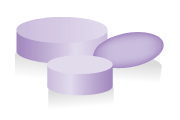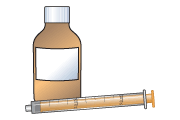Cetirizine for hayfever
This leaflet is for parents and carers about how to use this medicine in children. Our information may differ from that provided by the manufacturers, because their information usually relates to adults. Read this leaflet carefully. Keep it somewhere safe so that you can read it again.
Name of medicine
Cetirizine
Common brands: Benadryl Allergy, Piriteze, Zirtek
Why is it important for my child to take Cetirizine?
Hay fever is an allergic reaction to pollen. The body releases a chemical called histamine, which causes symptoms such as sneezing, runny nose and itchy, watery eyes. Cetirizine blocks the effects of histamine and so reduces the symptoms of hay fever.
People get hay fever at different times of the year depending on the type of pollen they are allergic to. Your child should take cetirizine regularly during their allergy season when the pollen count is high, which will help to keep symptoms under control.
What is Cetirizine available as?
- Tablets: 10 mg
- Liquid medicine: 5 mg in 5 mL; sugar-free versions are availablen
When should I give Cetirizine
Cetirizine can be given once or twice each day.
- Once a day: it can be given in the morning or the evening.
- Twice a day: give once in the morning and once in the evening. Ideally, these times are 10–12 hours apart, for example some time between 7am and 8am, and between 7pm and 8pm.
Give the medicine at about the same time(s) each day so that this becomes part of your child’s daily routine, which will help you to remember.
How much should I give?
Your doctor will work out the amount of Cetirizine (the dose) that is right for your child. The dose will be shown on the medicine label.
It is important that you follow your doctor’s instructions about how much to give.
How should I give Cetirizine?

Tablets
- Tablets should be swallowed with a glass of water, squash or juice. Your child should not chew the tablets.
- You can crush the tablet and mix it with a small amount of soft food such as yogurt, honey, or mashed potato. Make sure your child swallows it straight away, without chewing.

Liquid medicine
- Shake the medicine well.
- Measure out the right amount using an oral syringe or a medicine spoon. You can get these from your pharmacist. Do not use a kitchen teaspoon as it will not give the right amount.
When should the medicine start working?
Your child’s symptoms should start to improve 30-60 minutes after taking a dose of Cetirizine.
What if my child is sick (vomits)?
- If your child is sick less than 30 minutes after having a dose of Cetirizine, give them the same dose again.
- If your child is sick more than 30 minutes after having a dose of Cetirizine, do not give them another dose. Wait until the next normal dose.
If your child is sick again, seek advice from your family doctor, nurse, pharmacist, or hospital. They will decide what to do based on your child’s condition and the specific medicine involved.
What if I forget to give it?
If you usually give it once a day in the morning: Give the missed dose when you remember during the day, as long as this is at least 12 hours before the next dose is due.
If you usually give it twice a day: If you remember up to 4 hours after you should have given a dose, give your child the missed dose. For example, if you usually give a dose at about 7am, you can give the missed dose at any time up to 11am. If you remember after that time, do not give the missed dose. Give the next dose as usual.
If you usually give it once a day in the evening: If you remember before bedtime, give the missed dose. You do not need to wake a sleeping child to give a missed dose. You can give the missed dose in the morning, as long as this is at least 12 hours before the evening dose is due.
What if I give too much?
You are unlikely to cause harm if you give an extra dose of Cetirizine by mistake. If you are concerned that you may have given too much, contact your doctor or local NHS services (details at end of leaflet). Have the medicine or packaging with you if you telephone for advice.
Are there any possible side effects?
We use medicines to make our children better, but sometimes they have other effects that we don’t want (side effects).
Side effects you must do something about
If your child has an irregular or fast heart rate (fluttery or racing), contact your doctor straight away.
Other side-effects you need to know about
Your child may feel sleepy, drowsy or sluggish for a few hours after taking Cetirizine, so it may be better to give Cetirizine in the evening rather than the morning.
Your child may have a dry mouth. Eating citrus fruits (e.g. oranges) and sipping water may help.
Your child may feel dizzy or light-headed when they stand up. Encourage them to sit down for a short time after taking the medicine and to stand up slowly and to sit or lie down if they feel dizzy or light-headed.
Your child’s eyesight may be blurred (fuzzy).
They may get headaches.
Your child may have constipation (difficulty doing a poo, or doing a poo less often than usual). Encourage them to drink plenty of fluid and to eat foods that contain fibre (e.g. wholemeal foods, fruit and vegetables). If this is still a problem after 2 weeks, contact your doctor.
Your child may find that they urinate (do a wee) less often, or have difficulty doing a wee. Contact your doctor if this happens.
There may sometimes be other side effects that are not listed above. If you notice anything unusual and are concerned, contact your doctor. You can report any suspected side effects to a UK safety scheme at mhra.gov.uk/yellowcard
Can other medicines be given at the same time as Cetirizine?
- You can give your child medicines that contain paracetamol or ibuprofen, unless your doctor has told you not to.
Check with your doctor or pharmacist before giving any other medicines to your child. This includes herbal and complementary medicines.
Is there anything else I need to know about this medicine?
- If your child continues to get symptoms of hay fever, contact your doctor. They may consider other treatments.
- Symptoms of eczema and asthma may get worse during the hay fever season. If this happens, contact your doctor.
General advice about medicines
- Try to give medicines at about the same times each day, to help you remember.
- Only give this medicine to your child. Never give it to anyone else, even if their condition appears to be the same, as this could do harm.
- If you think someone else may have taken the medicine by accident, contact your doctor or NHS local services (details at end of leaflet) for advice.
- Make sure that the medicines you have at home have not reached the ‘use by’ date on the packaging. Give old medicines to your pharmacist to dispose of.
If you think someone else may have taken the medicine by accident, contact your doctor straight away.
Where should I keep this medicine?
- Keep the medicine in the container it came in.
- Keep the medicine in a cupboard, away from heat and direct sunlight.
- Make sure that children cannot see or reach the medicine.
- It does not need to be kept in the fridge.
Who to contact for more information?
Your child’s doctor, pharmacist or nurse will be able to give you more information about Cetirizine and about other medicines used to treat hay fever.
England: NHS 111
Tel 111
www.nhs.ukScotland: NHS 24
Tel 111
www.nhs24.scotNorthern Ireland: NI Direct
Wales: NHS 111 Wales
Tel 111
www.111.wales.nhs.ukAllergy UK
01322 619898
www.allergyuk.orgItchy Sneezy Wheezy
Copyright disclaimer
Version [1]. © NPPG, RCPCH and WellChild, all rights reserved. Review by .
The primary source for the information in this leaflet is the British National Formulary for Children. For details on any other sources used for this leaflet, please contact us through our website, www.medicinesforchildren.org.uk.
We take great care to make sure that the information in this leaflet is correct and up-to-date. However, medicines can be used in different ways for different patients. It is important that you ask the advice of your doctor or pharmacist if you are not sure about something. This leaflet is about the use of these medicines in the UK, and may not apply to other countries. The Royal College of Paediatrics and Child Health (RCPCH), the Neonatal and Paediatric Pharmacists Group (NPPG), WellChild and the contributors and editors cannot be held responsible for the accuracy of information, omissions of information, or any actions that may be taken as a consequence of reading this leaflet.
